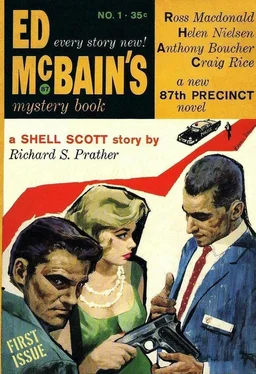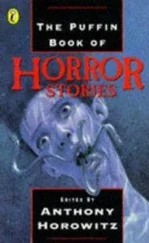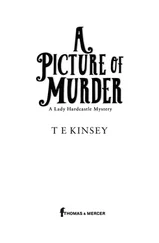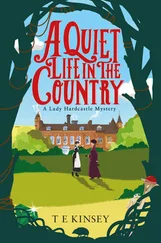Anthony Boucher - Ed McBain’s Mystery Book, No. 1, 1960
Здесь есть возможность читать онлайн «Anthony Boucher - Ed McBain’s Mystery Book, No. 1, 1960» весь текст электронной книги совершенно бесплатно (целиком полную версию без сокращений). В некоторых случаях можно слушать аудио, скачать через торрент в формате fb2 и присутствует краткое содержание. Город: New York, Год выпуска: 1960, Издательство: Pocket Books, Жанр: Детектив, на английском языке. Описание произведения, (предисловие) а так же отзывы посетителей доступны на портале библиотеки ЛибКат.
- Название:Ed McBain’s Mystery Book, No. 1, 1960
- Автор:
- Издательство:Pocket Books
- Жанр:
- Год:1960
- Город:New York
- ISBN:нет данных
- Рейтинг книги:5 / 5. Голосов: 1
-
Избранное:Добавить в избранное
- Отзывы:
-
Ваша оценка:
- 100
- 1
- 2
- 3
- 4
- 5
Ed McBain’s Mystery Book, No. 1, 1960: краткое содержание, описание и аннотация
Предлагаем к чтению аннотацию, описание, краткое содержание или предисловие (зависит от того, что написал сам автор книги «Ed McBain’s Mystery Book, No. 1, 1960»). Если вы не нашли необходимую информацию о книге — напишите в комментариях, мы постараемся отыскать её.
Ed McBain’s Mystery Book, No. 1, 1960 — читать онлайн бесплатно полную книгу (весь текст) целиком
Ниже представлен текст книги, разбитый по страницам. Система сохранения места последней прочитанной страницы, позволяет с удобством читать онлайн бесплатно книгу «Ed McBain’s Mystery Book, No. 1, 1960», без необходимости каждый раз заново искать на чём Вы остановились. Поставьте закладку, и сможете в любой момент перейти на страницу, на которой закончили чтение.
Интервал:
Закладка:
Higher authorities ignored the jury’s strong recommendation. On April 29, 1943, August Sangret was hanged at Wandsworth Gaol and his body turned over to Dr. Keith Simpson (and Molly Lefebure) for the post mortem.
Assassin
Fletcher Flora
Crossing the hotel lobby, Arley Sears descended two steps and pushed his way through a silent swinging door into the cool shadows of a cocktail lounge. He stood quietly for a moment while his eyes dilated in adjustment to the shadows, and then he saw Laurel sitting alone at a tiny table, designed for five-o’clock intimacy, beyond half-a-dozen other tables that were now unclaimed. She was wearing a black linen sheath that had drawn, in the way of sheaths, above her nylon knees, and her pale hair was a light in the ersatz dusk. He felt, seeing her, the familiar resurgence of lust and love and pity and pain that he always felt when seeing her anywhere at any time, or even when, not seeing her, he remembered the last time and waited for the next.
Making his way among the tables, he sat down across from her, the tiny table between them and their knees touching beneath. Her right hand lay beside her stemmed glass, palm down, and he dropped his own beside it in the opposite position. The hands lay at rest for seconds side by side, and then hers crept into his and was at rest again. The bartender, the only other person in the room, arrived and waited. Arley, suddenly aware of him, glanced up and down again, looking at the glass, half filled with amber, beside the clasped hands.
“What are you having?” he said. “A daiquiri?”
“Yes,” she said, “a daiquiri.”
“It looks good,” he said. “I think I’ll have the same.”
“A daiquiri is good on a hot day,” the bartender said.
He went back to the bar to make it, and Arley and Laurel sat silent, hands clasped, until he had returned and gone again. Laurel’s hand lay in his as still as a white stone, but Arley could sense, as he always could, the intensity of her excitement. He could measure it by the slow cadence of her controlled breathing and the brightness of her eyes and the barely perceptible rigidity of her thin face. It was more than excitement, really. Much more. It was a fever and a sickness, and it made him sick to see it. Perhaps she was not quite sane. Whatever you called it, sickness or insanity or dedication, she would never be well, the fever slaked, until he had done for her, after all these years, what he would surely do within the next half-hour.
An eye for an eye, he thought. A tooth for a tooth.
He rarely thought in biblical terms, and it disturbed him that he did so now. He did not wish to think in terms of retribution or primitive justice. He wished to think only in terms of what he must do for Laurel’s sake — and for his own, as a corollary, because he could never recover her if he did not.
“Have you been outside?” he said.
“No.”
“The streets and the square are packed.”
“I know. I watched from the window of the room.”
“Did you leave your key at the desk?”
“Yes. My door is unlocked.”
“Good. The clerk will remember that you were out of your room all the while, and the bartender will remember your being here.”
“At most, they’ll be able to estimate only the general direction of the shot. It may not come to what the clerk or the bartender will think or say.”
“Probably not, but it’s just as well to anticipate things.”
“Darling, I’ll kill myself if it goes wrong for you. I swear I will.”
“Don’t think about that. It will go well.”
“You must be careful that no one sees you when you go up.”
“It’s not likely. Everyone’s attention will be focused on the square within the next ten minutes. There should be no difficulty in slipping up the stairs. Afterward, I’ll simply come down the back way, as you directed, and around to the front entrance on the outside.”
“Suppose someone sees you coming down.”
“That’s a risk. A slight one. I told you that. Chances are, however, most of the hotel help will be around front in the crowd or up on the roof. It’s something we have to count on.”
“It seems very dangerous. So much depends on things going just right.”
“You wanted it this way. You said you wanted it just when everything was going big for him. All at once, you said, with a big crowd cheering.”
“Yes. That’s what I want.” The fever was raging now in her bright, bright eyes. “And later, darling, we’ll go away, you and I, and I’ll be so good to you, and always so grateful, and I’ll make you happy and never sorry for what you did. I promise.”
“Sure,” he said. “Everything will be fine.”
She withdrew her hand from his and lifted her glass, touching her lips with the thin edge of crystal. He lifted his own in response, and they drank together to everything being fine, and then they continued to sit in silence drinking the daiquiris slowly. After a while they became conscious of a kind of beating in their ears, the diminished waves of a giant sound a long way off, but it was actually the crowd in the bright, hot streets and square outside the closed and air-conditioned hotel. The bartender, leaving the bar, walked down the room among the tables and chairs to a window covered by heavy maroon drapes. He pulled the drapes back a few inches on one side and stood there with his back to the room, looking out across the street to the square beyond.
“He’s arrived,” Arley said. “You can hear the crowd now.”
“Yes,” she said. “He’ll begin speaking in a few minutes.”
“I’d better go up.”
“You remember the room number?”
“Yes.”
“You remember what to do and where to go afterward?”
“I remember.”
“Good luck, darling.”
“Good is our kind. We won’t change it now.”
“Hurry back, darling. I’ll be waiting here.”
He stood and turned and walked away without looking back, ascending the pair of steps into the lobby and crossing to the stairs beyond the elevator. The clerk and two other men were standing at the front entrance, staring out through the glass of the double door. They did not hear him or turn to see him as he went up the stairs to the first landing and passed out of view.
He climbed to the third floor, next to the top, and turned right from the stairs and walked down the hall, parallel to the street, to the last room on the street side. The hall made a right-angle turn to the left there, running the length of a wing to the rear of the building, where there was a narrow green door that opened, he knew, upon narrow stairs descending to an alley exit. He paused outside the room, Laurel’s room, looking down the empty hall to the green door, and then he took a pair of thin cotton gloves from a pocket and put them on and opened the door to the room and entered. Inside, he abandoned the casual attitude he had sustained so far and began to move swiftly, with economy of motion and deadly purpose.
From a closet, where Laurel had left it, he took a rifle, already assembled. He checked to make certain it was loaded, and it was. Smokeless cartridge. There was a telescopic sight attached, but at this distance he would not need it. He had been firing rifles since he was a boy, and he was an expert marksman.
Moving to a window overlooking the street and the courthouse square across the street, he knelt before it on one knee and raised the sash just enough to allow him to sight through the narrow opening from the kneeling position, the tip of the rifle barrel resting on the sill. The air above the street shimmered with heat, distorting his vision, and he closed his eyes for a moment, retreating briefly into darkness with a sense of vast reprieve. The crowd below was silent now, caught and held by a tall man with a mane of black hair who stood raised above them on an improvised platform on the courthouse lawn. The man’s voice, amplified, a strangely harsh and mesmerizing cry, was clearly audible to Arley, kneeling by the window, but the words, whatever they were, did not register and had no meaning. Opening his eyes, coming out again from darkness, Arley squinted through the telescopic sight at a patch of black hair above a close-set ear.
Читать дальшеИнтервал:
Закладка:
Похожие книги на «Ed McBain’s Mystery Book, No. 1, 1960»
Представляем Вашему вниманию похожие книги на «Ed McBain’s Mystery Book, No. 1, 1960» списком для выбора. Мы отобрали схожую по названию и смыслу литературу в надежде предоставить читателям больше вариантов отыскать новые, интересные, ещё непрочитанные произведения.
Обсуждение, отзывы о книге «Ed McBain’s Mystery Book, No. 1, 1960» и просто собственные мнения читателей. Оставьте ваши комментарии, напишите, что Вы думаете о произведении, его смысле или главных героях. Укажите что конкретно понравилось, а что нет, и почему Вы так считаете.












